|
Гипермаркет знаний>>Английский язык>>Английский язык 6 класс>> Thеrе was a young lady of Nigеr

Конструкция There is / There are in the Past Simple
Вы уже знакомы с конструкцией There is / There are.
Она используется, чтобы сообщить о наличии какого-либо лица / предмета в каком-либо месте.
В Past Simple в этой конструкции используются вторые формы глагола to be —was и were.
Конструкция There was / There were используется в тех же случаях и употребляется по тем же правилам.
There was a bus stop near my house. — Около моего дома была автобусная остановка.
There were some books on the table. — На столе лежали книги. Вопросительные и отрицательные предложения образуются по общему правилу употребления глагола to be в Past Simple.
1 Say the sentences in the Past Simple.
Model:There are a lot of people in the shop today. — There were a lot of
people in the shop yesterday.
1. There's somebody in my room.
2. There's nothing in the fridge.
3. There are some children in the street.
4. Is there anything interesting in that book?
5. Are there any good books in the bookshop?
6. There are very few people in the park this week.
7. There's nothing in his fridge today.
8. There's no hot water in their houses this winter.
9. How many boys are there in your class this year?
10. What is there in your garden this year?
2 Fill in the gaps and complete the sentences. Use there is, there are, there was, there were. Pay attention to word order.
1. ... a lot of people in the theatre yesterday.
2. ... a lot of roses in your garden this year?
3. ... water or tea in your mug?
4. How many shops ... in your town five years ago?
5. There ... a lot of flowers in England in May.
6. ... a lot of guests in your flat yesterday?
7. How many posters ... in your room?
8. ... any mistakes in your test last week?
3 Listen to the speaker and correct the mistakes in the picture: What was there in the ghost town?
Model:In the ghost town there was / were...
In the ghost town there wasn't any...
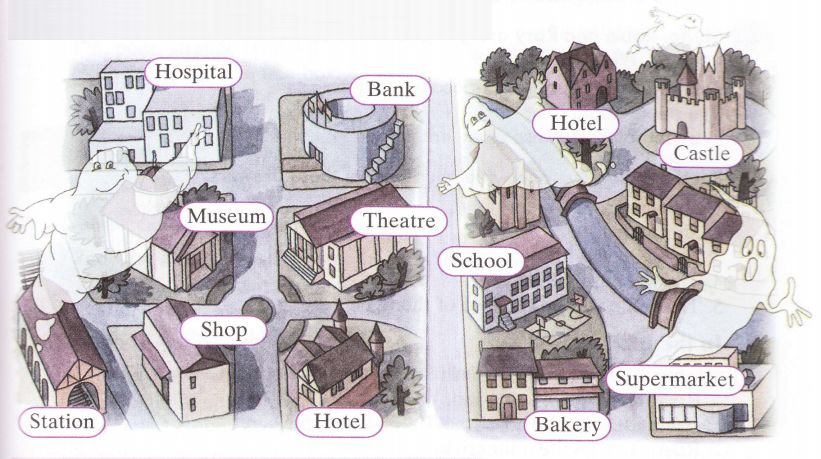
Сложноподчиненные предложения
с придаточными определительными
Придаточное определительное предложение обычно относится к существительному главного предложения и следует за ним. Придаточное определительное вводится союзными словами who (который), если оно относится к одушевленному предмету, илиwhich (который) — если оно относится к неодушевленному предмету.
This is the man who helped me. — Это человек, который мне помог.
Yesterday I saw the book which I wanted to read. — Вчера я видел книгу, которую хотел почитать.
4 Change the sentences according to the model.
Model:Look at this girl. She speaks three foreign languages: English,
German and Spanish. — This is the girl who speaks three foreign
languages: English, German and Spanish.
1. Look at this cake. It's very tasty.
2. Look at this actor. He played in my favourite film.
3. Look at this woman. She knows everything about cats and dogs.
4. Look at this table. My grandfather bought it sixty years ago.
5. Look at this man. He helped me find my way in the forest yesterday.
6. Look at this boy. He came to our class last year.
7. Look at this girl. She always gets very good marks in English.
5 Misha, Robin and Rosy are going to Salisbury Plain. Listen to the dialogue and say: What's a limerick?
a) a nonsense poem (стих-бессмыслица)
b) a poem about love
c) a kind of Scottish song
6 Read the dialogue and write questions for these answers.
1. She was from Niger.
2. She smiled.
3. The lady was inside.
4. The tiger ate the lady.
5. The smile was on the face of the tiger.
In the car
Robin: It's so boring to sit in the car and do nothing!
Rosy: Let's have some fun.
Misha: But how? There's no TV or computer here.
Rosy: Let's write a limerick.
Misha: What's a limerick?
Rosy: A limerick is a nonsense poem. It's short and funny. The first person who wrote limericks was Edward Lear, a Victorian writer. Here's one of his limericks:
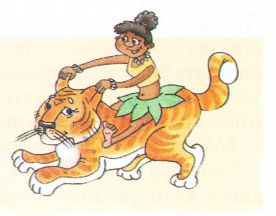
There was a young lady of Niger ['naigs],
Who smiled when she rode on a tiger;
They returned from the ride,
With the lady inside,
And a smile on the face of the tiger.
Limerick  — лимерик.The English like these short funny poems. Usually there are five lines in a У limerick. The first line rhymes with the second and the last — лимерик.The English like these short funny poems. Usually there are five lines in a У limerick. The first line rhymes with the second and the last
lines and the third line rhymes with the fourth line.
Victorian  — викторианский. The period of time named after Queen Victoria who reigned in Britain from 1837 to 1901. — викторианский. The period of time named after Queen Victoria who reigned in Britain from 1837 to 1901.
7 Put the lines of this limeriсk in the right ordeг.
And shе got very сold,
Thеrе Was a strangе lady of Сoх,
But thе lady was old,
oh, poor, strangе lady of Coх.
Who wantеd to livе in a box:
Guess the meaning of the underlined words.
1. I like cakes and biscuits ['biskits].
2. Kangaroos  livе in Australia livе in Australia  . .
8 Read the limericks and answer the questions:
1. Which of them did Misha write?
2. Which of them did Robin write?
3. Which of them did Rosy write?
Tip: There weren't any animals in Rosy's limerick. Misha's limerick wasn't about a man. Misha and Robin: Limericks are easy! We can write limericks too.
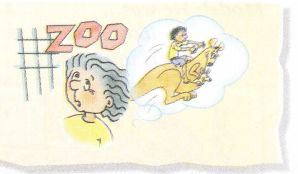
1. There was a young man of Peru  , ,
Who wanted to ride a kangaroo;
But when he came to the zoo,
There was no kangaroo,
And that saved the young man of Peru.
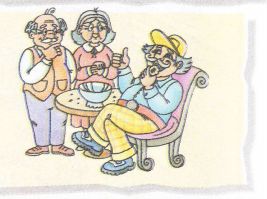
2. There was an old man of Hungary  , ,
Who was always thirsty and hungry;
When he came for a visit,
He ate all his friends' biscuits,
And they finally sent him to Hungary.
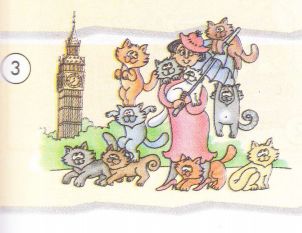
3. There was an old lady of London,
Who always had ten cats around her;
When she went out alone,
She couldn't find the way home,
And the cats found the lady in London.
9 Which limerick is the best, the worst, the funniest? Why?
10 Find the name of a city and the names of two countries in the limeriks.
11 Match the Past Simple forms of the verbs from the limericks with their infinitive forms.

Homework
A Look at the pictures. In the pictures you can see the same room before and after the robbery. Describe the pictures and answer the question: What did the robber take?
Model:(Picture 1) There was / were...
(Picture 2) There is / are...
What can you say about the robber:
What is he interested in? What does he like?
Model:He was...
He likes...
He is interested in...

 Here are four famous robbers. Which of them robbed the flat in the picture? Explain your answer. Here are four famous robbers. Which of them robbed the flat in the picture? Explain your answer.
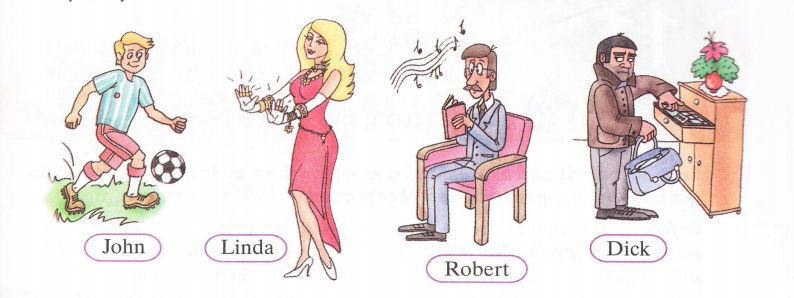
В Fill in the gaps and complete the sentences. Use which or who.
1. I knew a lady ... played tennis every day.
2. Kate found a bag ... she wanted to buy.
3. He came with Jack, ... was his best friend.
4. This is the film ... my mother really likes.
5. Everybody looked at the table ... stood in the middle of the room.
6. Let me introduce you to the man ... saved my life.
7. This is the book ... I liked.
С Translate the sentences into Russian.
1. When I was five, I lived in a house which was very old.
2. The girl who is talking to you is my friend's sister.
3. Yesterday Sasha spoke to a woman who knew his grandfather.
4. She liked the present which her brother gave her.
5. There were some children in the room when Mum came home.
К. И. Кауфман, М. Ю. Кауфман Английский язык: Счастливый английский.ру / Happy English.ru: Учебник англ. яз. для 6 кл. общеобраз. учрежд.— Обнинск: Титул, 2008.— 288 с: ил.
Помощь школьнику онлайн, Английский язык для 6 класса скачать, календарно-тематическое планирование
Содержание урока
 конспект урока конспект урока
 опорный каркас опорный каркас
 презентация урока презентация урока
 акселеративные методы акселеративные методы
 интерактивные технологии
Практика интерактивные технологии
Практика
 задачи и упражнения задачи и упражнения
 самопроверка самопроверка
 практикумы, тренинги, кейсы, квесты практикумы, тренинги, кейсы, квесты
 домашние задания домашние задания
 дискуссионные вопросы дискуссионные вопросы
 риторические вопросы от учеников
Иллюстрации риторические вопросы от учеников
Иллюстрации
 аудио-, видеоклипы и мультимедиа аудио-, видеоклипы и мультимедиа
 фотографии, картинки фотографии, картинки
 графики, таблицы, схемы графики, таблицы, схемы
 юмор, анекдоты, приколы, комиксы юмор, анекдоты, приколы, комиксы
 притчи, поговорки, кроссворды, цитаты
Дополнения притчи, поговорки, кроссворды, цитаты
Дополнения
 рефераты рефераты
 статьи статьи
 фишки для любознательных фишки для любознательных
 шпаргалки шпаргалки
 учебники основные и дополнительные учебники основные и дополнительные
 словарь терминов словарь терминов
 прочие
Совершенствование учебников и уроков прочие
Совершенствование учебников и уроков
 исправление ошибок в учебнике исправление ошибок в учебнике
 обновление фрагмента в учебнике обновление фрагмента в учебнике
 элементы новаторства на уроке элементы новаторства на уроке
 замена устаревших знаний новыми
Только для учителей замена устаревших знаний новыми
Только для учителей
 идеальные уроки идеальные уроки
 календарный план на год календарный план на год
 методические рекомендации методические рекомендации
 программы программы
 обсуждения
Интегрированные уроки обсуждения
Интегрированные уроки
Если у вас есть исправления или предложения к данному уроку, напишите нам.
Если вы хотите увидеть другие корректировки и пожелания к урокам, смотрите здесь - Образовательный форум.
|



















